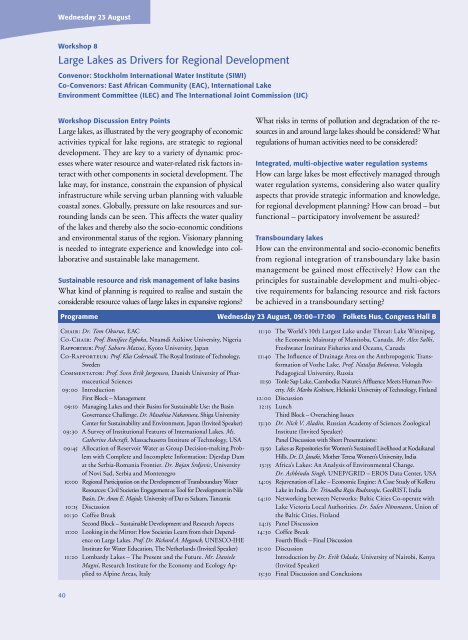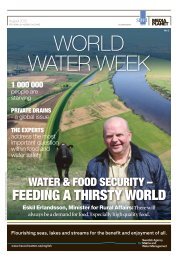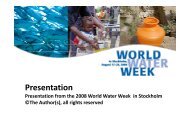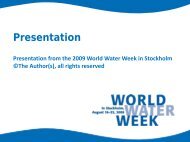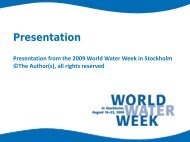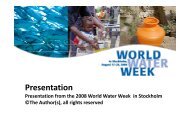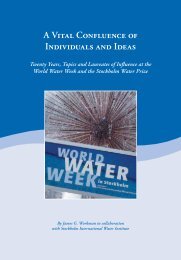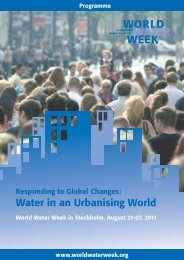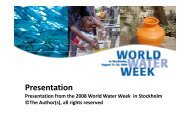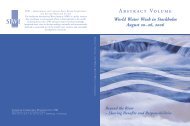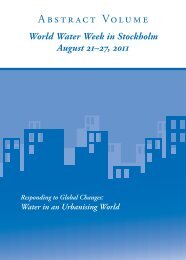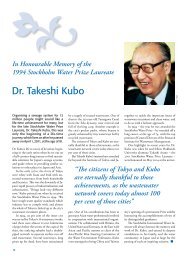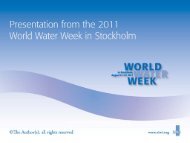Final Programme Beyond the River - World Water Week
Final Programme Beyond the River - World Water Week
Final Programme Beyond the River - World Water Week
Create successful ePaper yourself
Turn your PDF publications into a flip-book with our unique Google optimized e-Paper software.
Wednesday 23 August<br />
Workshop 8<br />
Large Lakes as Drivers for Regional Development<br />
Convenor: Stockholm International <strong>Water</strong> Institute (SIWI)<br />
Co-Convenors: East African Community (EAC), International Lake<br />
Environment Committee (ILEC) and The International Joint Commission (IJC)<br />
Workshop Discussion Entry Points<br />
Large lakes, as illustrated by <strong>the</strong> very geography of economic<br />
activities typical for lake regions, are strategic to regional<br />
development. They are key to a variety of dynamic processes<br />
where water resource and water-related risk factors interact<br />
with o<strong>the</strong>r components in societal development. The<br />
lake may, for instance, constrain <strong>the</strong> expansion of physical<br />
infrastructure while serving urban planning with valuable<br />
coastal zones. Globally, pressure on lake resources and surrounding<br />
lands can be seen. This affects <strong>the</strong> water quality<br />
of <strong>the</strong> lakes and <strong>the</strong>reby also <strong>the</strong> socio-economic conditions<br />
and environmental status of <strong>the</strong> region. Visionary planning<br />
is needed to integrate experience and knowledge into collaborative<br />
and sustainable lake management.<br />
Sustainable resource and risk management of lake basins<br />
What kind of planning is required to realise and sustain <strong>the</strong><br />
considerable resource values of large lakes in expansive regions?<br />
What risks in terms of pollution and degradation of <strong>the</strong> resources<br />
in and around large lakes should be considered? What<br />
regulations of human activities need to be considered?<br />
Integrated, multi-objective water regulation systems<br />
How can large lakes be most effectively managed through<br />
water regulation systems, considering also water quality<br />
aspects that provide strategic information and knowledge,<br />
for regional development planning? How can broad – but<br />
functional – participatory involvement be assured?<br />
Transboundary lakes<br />
How can <strong>the</strong> environmental and socio-economic benefits<br />
from regional integration of transboundary lake basin<br />
management be gained most effectively? How can <strong>the</strong><br />
principles for sustainable development and multi-objective<br />
requirements for balancing resource and risk factors<br />
be achieved in a transboundary setting?<br />
<strong>Programme</strong> Wednesday 23 August, 09:00–17:00 Folkets Hus, Congress Hall B<br />
Chair: Dr. Tom Okurut, EAC<br />
Co-Chair: Prof. Boniface Egboka, Nnamdi Azikiwe University, Nigeria<br />
Rapporteur: Prof. Saburo Matsui, Kyoto University, Japan<br />
Co-Rapporteur: Prof. Klas Cederwall, The Royal Institute of Technology,<br />
Sweden<br />
Commentator: Prof. Sven Erik Jørgensen, Danish University of Pharmaceutical<br />
Sciences<br />
09:00 Introduction<br />
First Block – Management<br />
09:10 Managing Lakes and <strong>the</strong>ir Basins for Sustainable Use: <strong>the</strong> Basin<br />
Governance Challenge. Dr. Masahisa Nakamura, Shiga University<br />
Center for Sustainability and Environment, Japan (Invited Speaker)<br />
09:30 A Survey of Institutional Features of International Lakes. Ms.<br />
Ca<strong>the</strong>rine Ashcraft, Massachusetts Institute of Technology, USA<br />
09:45 Allocation of Reservoir <strong>Water</strong> as Group Decision-making Problem<br />
with Complete and Incomplete Information: Djerdap Dam<br />
at <strong>the</strong> Serbia-Romania Frontier. Dr. Bojan Srdjevic, University<br />
of Novi Sad, Serbia and Montenegro<br />
10:00 Regional Participation on <strong>the</strong> Development of Transboundary <strong>Water</strong><br />
Resources: Civil Societies Engagement as Tool for Development in Nile<br />
Basin. Dr. Amos E. Majule, University of Dar es Salaam, Tanzania<br />
10:15 Discussion<br />
10:30 Coffee Break<br />
Second Block – Sustainable Development and Research Aspects<br />
11:00 Looking in <strong>the</strong> Mirror: How Societies Learn from <strong>the</strong>ir Dependence<br />
on Large Lakes. Prof. Dr. Richard A. Meganck, UNESCO-IHE<br />
Institute for <strong>Water</strong> Education, The Ne<strong>the</strong>rlands (Invited Speaker)<br />
11:20 Lombardy Lakes – The Present and <strong>the</strong> Future. Mr. Daniele<br />
Magni, Research Institute for <strong>the</strong> Economy and Ecology Applied<br />
to Alpine Areas, Italy<br />
11:30 The <strong>World</strong>’s 10th Largest Lake under Threat: Lake Winnipeg,<br />
<strong>the</strong> Economic Mainstay of Manitoba, Canada. Mr. Alex Salki,<br />
Freshwater Institute Fisheries and Oceans, Canada<br />
11:40 The Influence of Drainage Area on <strong>the</strong> Anthropogenic Transformation<br />
of Vozhe Lake. Prof. Natalya Bolotova, Vologda<br />
Pedagogical University, Russia<br />
11:50 Tonle Sap Lake, Cambodia: Nature’s Affluence Meets Human Poverty.<br />
Mr. Marko Keskinen, Helsinki University of Technology, Finland<br />
12:00 Discussion<br />
12:15 Lunch<br />
Third Block – Overaching Issues<br />
13:30 Dr. Nick V. Aladin, Russian Academy of Sciences Zoological<br />
Institute (Invited Speaker)<br />
Panel Discussion with Short Presentations:<br />
13:50 Lakes as Repositories for Women’s Sustained Livelihood at Kodaikanal<br />
Hills. Dr. D. Janaki, Mo<strong>the</strong>r Teresa Women’s University, India<br />
13:55 Africa’s Lakes: An Analysis of Environmental Change.<br />
Dr. Ashbindu Singh, UNEP/GRID – EROS Data Center, USA<br />
14:05 Rejuvenation of Lake – Economic Engine: A Case Study of Kolleru<br />
Lake in India. Dr. Trinadha Raju Rudraraju, GeoRIST, India<br />
14:10 Networking between Networks: Baltic Cities Co-operate with<br />
Lake Victoria Local Authorities. Dr. Sulev Nömmann, Union of<br />
<strong>the</strong> Baltic Cities, Finland<br />
14:15 Panel Discussion<br />
14:30 Coffee Break<br />
Fourth Block – <strong>Final</strong> Discussion<br />
15:00 Discussion<br />
Introduction by Dr. Erik Odada, University of Nairobi, Kenya<br />
(Invited Speaker)<br />
15:30 <strong>Final</strong> Discussion and Conclusions<br />
40


